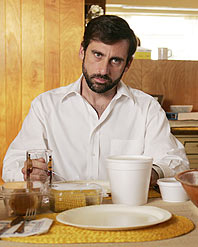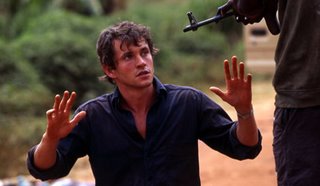 Why, I ask you, is Alan Arkin the one who was nominated for Best Supporting Actor? His role as the coke-snorting, foul-mouthed grandpa is probably the most stereotypical one in this family, and, while it's really the script's fault for never really eschewing that, Arkin's commendations are limited to a couple of clever line readings. Much better, in
Why, I ask you, is Alan Arkin the one who was nominated for Best Supporting Actor? His role as the coke-snorting, foul-mouthed grandpa is probably the most stereotypical one in this family, and, while it's really the script's fault for never really eschewing that, Arkin's commendations are limited to a couple of clever line readings. Much better, in  my view, are the other two supporting men here- Steve Carell as Uncle Frank, the gay suicidal Proust scholar, and particularly Paul Dano as the silent Nietzsche-reading teenage son Dwayne. Granted, they are given more to do than Arkin is, and therefore their characters break out of the potentially stereotyped arena, but just watch them to see how much more deserving they were: Carell does so much with just his eyes- you understand why Frank wanted to kill himself, and why he probably still does, and, ultimately, how he moves past this stage. See how precisely he has down the character's minute details, too- the oddly hilarious way he runs towards the pageant building, arms rigid and back arched, halting suddenly at the automatic doors. And how he spins the various lines he reads, mixing his distinctive comic persona with the depressed character he is playing here.
my view, are the other two supporting men here- Steve Carell as Uncle Frank, the gay suicidal Proust scholar, and particularly Paul Dano as the silent Nietzsche-reading teenage son Dwayne. Granted, they are given more to do than Arkin is, and therefore their characters break out of the potentially stereotyped arena, but just watch them to see how much more deserving they were: Carell does so much with just his eyes- you understand why Frank wanted to kill himself, and why he probably still does, and, ultimately, how he moves past this stage. See how precisely he has down the character's minute details, too- the oddly hilarious way he runs towards the pageant building, arms rigid and back arched, halting suddenly at the automatic doors. And how he spins the various lines he reads, mixing his distinctive comic persona with the depressed character he is playing here. And Dano, who at this point still gets my vote for the year's best supporting actor, plays the moody teenager down to a tee- it's remarkable how sour he manages to keep Dwayne's face when he's around his family, portraying so much through the tiniest raising of eyebrows or darting of eyes. Dano also understands perfectly the offbeat relationships he has with his family: exasperated by his mother (Toni Collette), slightly fearful of his step-grandfather, distant but protective of his sister Olive (Abigail Breslin), and annoyed at his step-father's (Greg Kinnear) ironic failure. When Dwayne finally speaks, it's an utterly shattering moment, but more for what Dano does to lead up to it: the galling horror of his face bleeds the idea that Dwayne has just had the floor vanish from under his entire existance. Dano is able to, at once, give the sense that Dwayne is both separate from and grudgingly within his family unit.
And Dano, who at this point still gets my vote for the year's best supporting actor, plays the moody teenager down to a tee- it's remarkable how sour he manages to keep Dwayne's face when he's around his family, portraying so much through the tiniest raising of eyebrows or darting of eyes. Dano also understands perfectly the offbeat relationships he has with his family: exasperated by his mother (Toni Collette), slightly fearful of his step-grandfather, distant but protective of his sister Olive (Abigail Breslin), and annoyed at his step-father's (Greg Kinnear) ironic failure. When Dwayne finally speaks, it's an utterly shattering moment, but more for what Dano does to lead up to it: the galling horror of his face bleeds the idea that Dwayne has just had the floor vanish from under his entire existance. Dano is able to, at once, give the sense that Dwayne is both separate from and grudgingly within his family unit.Breslin, Kinnear and Collette (who I seemed to remember having less to do) are also very good, and so I question again: why is Alan Arkin, easily the least impressive of this family of six, the one nominated? (I know Breslin is nominated too- deservedly, I think, although without currently having seen any of her fellow nominees.) I despair sometimes.
--------------------------------------------------------------------------------------
The other thing that I just don't get on this frustrating day of all days is a more difficult point. A friend loaned me the well-recieved Rwandan genocide film Shooting Dogs (to be released as either In Every Human Heart or Beyond the Gates in the US, both of which strike me as rather trite titles), giving it a hearty recommendation, and I finally
 steeled myself to watch it last night. It's a perfunctorily proficient film, rougher than it's obvious companion piece Hotel Rwanda and less afraid to show actual details (there are a couple of particularly nasty moments), and yet I found much of it distinctly lacking in impact. Why is it that these type of films always seem to feel the need to filter these tragedies through the gaze of Western white men seems the obvious question to ask, but personally what I found most difficult about the film was it's rather portentious sideline of religion (spoilers ahead)- when it becomes obvious that the Rwandans enclosed in the school (the film's main setting), the resident priest Christopher (John Hurt) finds the most important thing to do is give them all communion. (spoilers done) I would be perfectly fine with this angle if the film wasn't so eager to approve it so much- where's the religious balance, the lack of bias? But my major problem is this: when I told my friend I was rarely moved and unimpacted by the film, she asked me if I had no heart. Shooting Dogs (and Hotel Rwanda for that matter) belong to that distinct group of films that if you don't think they're good, you're a heartless monster. Nevermind the quality of filmmaking, or acting, or the quality of the script, then- if it's a fact-based movie where innocent people are killed and you dislike it, you're a bastard. Thanks for that.
steeled myself to watch it last night. It's a perfunctorily proficient film, rougher than it's obvious companion piece Hotel Rwanda and less afraid to show actual details (there are a couple of particularly nasty moments), and yet I found much of it distinctly lacking in impact. Why is it that these type of films always seem to feel the need to filter these tragedies through the gaze of Western white men seems the obvious question to ask, but personally what I found most difficult about the film was it's rather portentious sideline of religion (spoilers ahead)- when it becomes obvious that the Rwandans enclosed in the school (the film's main setting), the resident priest Christopher (John Hurt) finds the most important thing to do is give them all communion. (spoilers done) I would be perfectly fine with this angle if the film wasn't so eager to approve it so much- where's the religious balance, the lack of bias? But my major problem is this: when I told my friend I was rarely moved and unimpacted by the film, she asked me if I had no heart. Shooting Dogs (and Hotel Rwanda for that matter) belong to that distinct group of films that if you don't think they're good, you're a heartless monster. Nevermind the quality of filmmaking, or acting, or the quality of the script, then- if it's a fact-based movie where innocent people are killed and you dislike it, you're a bastard. Thanks for that.

No comments:
Post a Comment